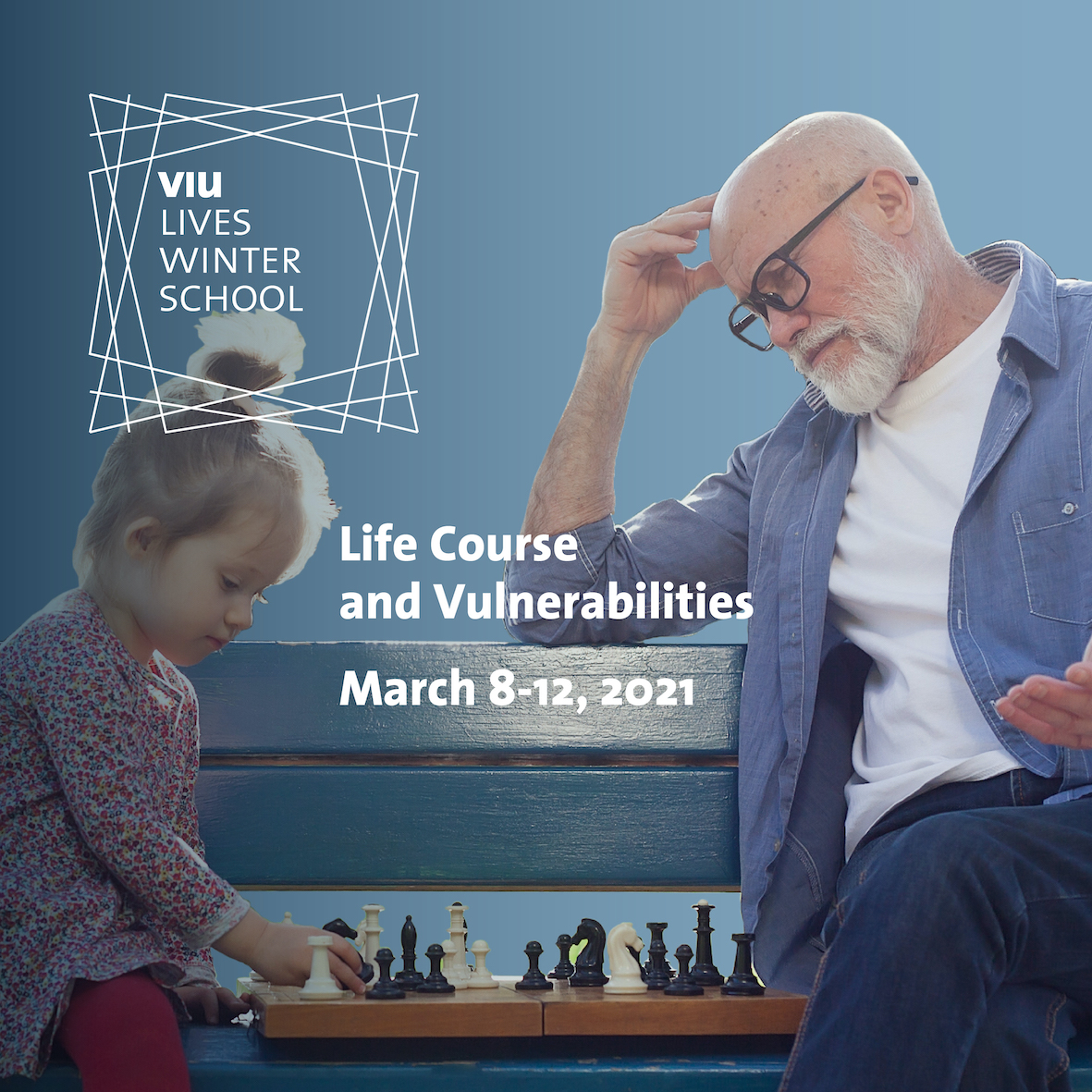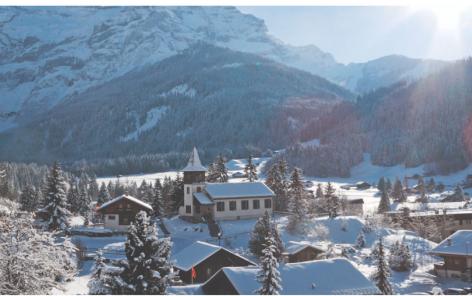During an intensive one-week programme, doctoral students and young researchers work on various fields of Life Course research through a multidisciplinary approach (Sociology, Psychology, Social Psychology, Life-span Psychology, Social Demography and Social Policies) on vulnerability across the life course. The Winter School focuses on training the participants in the drafting of research projects or journal articles as a fundamental aspect of the academic career they are approaching. With a “learning -by-doing” approach, participants go through all stages of these drafting processes. The School first targets PhD students, but Post-doc researchers are also eligible.
The seventh edition of the LIVES Winter School takes place from 7 to 11 March 2022 in collaboration with the Venice International University (VIU). The School first targets PhD students, but postdoc researchers can also apply.
Applications are extended until January 28, 2022!
Venue: In person - 7 to 11 March 2022 (please refer to the COVID measures in Italy below)
Fees:
- € 400 for students of VIU member Universities (VIU alumni are eligible for a reduced fee)
- € 600 LIVES Doctoral Program and its affiliated member Universities
- € 800 for students of other Universities
The fees will cover tuition, course materials, breakfasts and lunches, accommodation on the VIU campus on the Island of San Servolo in single rooms with private bathroom, and a social event. Participants will be responsible for covering their own travel expenses to and from Venice and local transportation.
Applicants can register via the following application form. More information on the workshops is available on the VIU website.
VIU / LIVES Winter school 2022 brochure
Information on the VIU Covid-19 Governmental Restrictions in Italy
 This is the sixth edition of the LIVES Winter School.
This is the sixth edition of the LIVES Winter School.
Venice International University - 8 to 12 March 2021. Applications open: from October 20, 2020 to January 31, 2021 via the VIU website. As the COVID-19 pandemic is ongoing, VIU will continue to monitor the situation, and in the event that it is not possible to confirm the program on the VIU campus as scheduled, other practicable solutions will be evaluated. Applicants and confirmed participants will be informed of any changes.
During an intensive one-week program, doctoral students and young researchers will work on various fields of Life Course research through a multidisciplinary approach (Sociology, Psychology, Social Psychology, Life-span Psychology, Social Demography and Social Policies) led by internationally renowned experts.
In particular, the Winter School will focus on training the participants in the drafting of research projects or journal articles as a fundamental aspect of the academic career they are approaching. With a “learning -by-doing” approach, participants will go through all stages of these drafting processes.
Application details
- Application form : https://www.univiu.org/study/summer-schools/viu-lives-winter-school-life-course-and-vulnerabilities/winter-school-lives-application-form
- Applicants: The School first targets PhD students, but postdoc researchers can also apply.
- Deadline: 31 January 2021
- Venue: Venice International University - 8 to 12 March 2021 (any changes in the programme will be communicated)
- Other information and details about the workshops:
https://www.univiu.org/study/summer-schools/viu-lives-winter-school-life-course-and-vulnerabilities

The fifth edition of the LIVES Winter School (April 1 - 5, 2019) is the first organized in collaboration with Venice International University (on its campus of Isola di San Servolo) and led by the two VIU member universities: the University of Lausanne and the University of Padua. In particular, the Winter School 2019 will focus on training the participants in the production of journal articles as a fundamental aspect of the academic career they are approaching: with a “learning by doing” approach, they will prepare collaborative articles going through all stages of the research process, heading towards a joint publication as a medium-term follow-up. Register now, last places available! Final deadline: December 14, 2018
During an intensive one-week program, doctoral students and young researchers will work on various fields of Life Course research through a multidisciplinary approach (Sociology, Psychology, Social Psychology, Life-span Psychology, Social Demography and Social Policies) on vulnerability across the life course. The School first targets PhD students, but Post-doc researchers are also eligible.
Affiliated institutions
-
Bremen International Graduate School of Social Sciences (BIGSSS), University of Bremen & Jacobs University (D)
-
Hallie Ford Center for Healthy Children & Families, Oregon State University (USA)
-
Centre for Population, Aging and Health, Western University (CA)
-
Ageing and Living Conditions Programme (ALC)
-
Faculty of Social Sciences, KU Leuven (BE)

Workshop 1
Social networks, social participation and life transitions: A life course perspective
With Eric Widmer (University of Geneva), Karin Wall (University of Lisbon), Rita Gouveia (University of Lisbon), Marie Baeriswyl (University of Geneva)
This workshop will explore the interplay between life transitions and changes in personal networks and social participation (for example to various kinds of associations). The pluralization of life courses that has characterized the experience of currently young adult cohorts has also affected those who are now retired or close to retirement. The occurrence and the timing of a variety of life transitions have increased in recent decades, making the family life cycle and traditional work-family arrangements less predictable and standardized than it once was.
This diversity of life trajectories has created additional challenges and contradictions in social networks and social participation. Individuals may have to adjust their personal relationships and social participations to their new life situation without having anticipated the need to do so. Additionally, members of their personal networks may also experience life transitions, which may have an effect on their relationships. In other words, social networks and social participations may be strongly interrelated with the way in which life transitions are experienced.
A focus on the transition to retirement will be proposed by the instructors, as such transition is expected to be associated with a major shift in personal networks and social participation, which still need to be better understood. Participants are invited to propose other life transitions to be considered.
The workshop aims to advance the empirical study of social networks and social participation in a life course perspective using novel longitudinal datasets made available by the LIVES program or other international datasets, such the Share data. Advanced multivariate quantitative methods will be used. The workshop readings, discussion and data analysis will provide a context for designing two to three papers that will be formulated during the workshop.
Workshop 2
How do values and political orientations develop across the life-span?
With Klaus Boehnke (Jacobs University), Regina Arant (Jacobs University), Maria Pavlova (University of Vechta) and Clemens Lechner (Gesis, Maheim - TBC)
This workshop will explore the life-span development of value preferences and political orientations. Is it really the case that people’s value preferences are more or less stable once people have become of age? Is the old folk wisdom really true that people become politically ever more conservative, the older they get? How does early-life political activism affect later-life psychosocial well-being? These are the three main questions addressed in the workshop.
The most influential political science value change theory, the approach developed by Ronald Inglehart in the 1970s, assumes that value preferences are acquired during the early years of life and depend—in their preference patterns—on the degree of need fulfillment during those years. If lower-level needs, as conceptualized in Abraham Maslow’s hierarchy of needs, remain unfulfilled during those years, people will cherish what they lacked and will accentuate survival values. If basic needs are by and large fulfilled during these years, people will rather cherish self-expression values. Intrapersonal development is rarely addressed by researchers with an interest in value change. To fill this gap is the focal aim of the workshop. Does the value stability assumption really pertain? And how does it relate to the mentioned folk wisdom that political orientations are said to become ever more conservative across the life-span?
A further question addressed will be the one what effects political activism has on the later-life development of value preferences and political orientations. And how does political activism affect psychosocial well-being and happiness during people’s later lives. It has been suggested that activism and volunteering affect mental health positively. At the same time it has been proposed that a good mental health is an indispensable prerequisite for political activism and volunteering. Can one shed more light on the causal direction of effects? This question will be addressed in the workshop as well.
The workshop aims to advance the empirical study of value change across the life-span using longitudinal (panel) datasets made available by the workshop leader or other international datasets, like the SOEP data set. The core data set will be coming from a study of some 200 early-age peace movement activists, who have been surveyed during their adolescent years in the mid-1980s and have then been followed every 3 ½ years in altogether 10 waves of data gathering. Latent growth modelling approaches will be used, as will be approaches from the tool-kit of repeated-measures ANOVA. The workshop readings, discussion and data analysis will provide a context for drafting two to three papers that will be formulated during the workshop.
The Winter School programme
Our joint winter school on life course studies has a specific design that differs from most of the other academic events of this kind: internationally renowned experts will lead two thematically different courses, with the aim of preparing collaborative articles through learning by doing. In a nutshell, the seven-day class represents all stages of a research process, heading towards a joint publication as a medium-term follow-up:
-
Firstly, based on the descriptions of the topical foci on the website, work groups of 6-8 participants plus faculty jointly investigate and define the topic of the workshop in more precise terms by reading pertinent papers selected by the organizers.
-
On this basis, the second step aims at a deepened discussion of possible hypotheses that will - or will not - structure the work with the available data.
-
The third day (‘lab day’) is dedicated to working ‘hands-on’. Data and measurements are presented, worked with and discussed in the two workshops. In a joint session, preliminary results are made available to both work groups.
-
After having scrutinized data, the concrete topics of the research project/paper are defined. These topics flow into the essential research questions the publication/s will tackle.
-
The last two days are dedicated to working on the initial drafts of the collaborative articles plus finally agreeing upon a work-plan for the two groups on how to complete manuscripts in the immediate aftermath of the workshop.

Workshop 1
Loss of a partner – a life-course perspective
Breakups and losses in intimate partnerships are among the most stressful live events with a high potential of vulnerabilization. This workshop explores life course after death, separation, or divorce. In particular it examines the social and psychological consequences of partnership changes due to critical events by taking into account in the role of biographical markers, especially marital/partnership history.
The rise in divorce and separation has contributed to the banalization of the status of living alone and lone parent; at the same time the reduction of mortality reduces the chances of becoming a widow before old age and contributed to the rise in the a-normativity of such states. On the one hand, changes in the prevalence of critical events like separation and death go hand in hand with changes in the way in which such events impact the life courses for different cohorts. On the other hand, psychological distress might occur at any historical time and for each cohort, even though to different degree or forms. We are interested how social isolation, re-partnering, psychological and physical health, professional changes, (re)entering education vary by age, gender, socio-economic status and cohorts. We want to shed light on whether the effects of critical events are sensitive to their timing in the life course, and how the duration since the event accounts form the direction and strength of its impact. These are some of the issues we will address at the workshop.
The workshop aims to advance the theoretical and empirical study of the vulnerability in the life course created by the critical transition occasioned by the loss of a partner. We will provide substantive and methodological expertise in the analysis of interdependent processes over the life course, considering both objective and subjective dimensions. On the one hand, we will draw on the major theoretical frames addressing losses from a variety of disciplinary perspectives (Demography, Sociology and Psychology). On the other hand we will be using novel LIVES datasets as well as national retrospective family surveys. We are going to rely on advanced quantitative and qualitative approaches in the analyses of survey data and interview data. Participants interested in the quantitative analyses are requested to be familiar with a statistical package for data analyses (e.g. STATA, SPSS, or R). Participants interested in the qualitative analysis are requested to be familiar with at least one software for CAQDAS (e.g. NVIVO, ATLAS.ti, MAXQDA) and to read and understand French or German (interviews’ language). It is also possible to bring own data for analysis. The readings, discussions, and data analysis performed during the workshop aim at designing and developing one or more common papers, which will be formulated during the workshop and produced during the following months.
Workshop 2
How to preserve cognitive health in old age?
Vulnerability to age-related deficits in fundamental abilities such as cognitive health is one of the most important challenges in the western world where human longevity has dramatically increased over the last 100 years. The relevance of intact cognition for everyday life functioning and well-being is crucial. Thus, one of the fundamental challenges for gerontological research is how to maintain and promote cognitive health in old age. A remarkable finding in this context is that some individuals are more susceptible to severe cognitive impairments while others are able to maintain a relatively high level of cognitive functioning, even in very old age. Hence, it is necessary to identify and understand the predictors of how interindividual differences in cognitive resources and in vulnerability to cognitive decline emerge.
In this workshop, we will address this hot topic by investigating the role of several key factors such as cognitive reserve (i.e., intellectual activities during childhood and the adult lifespan), health variables, personality, motivation, and contextual determinants for explaining the enormous interindividual differences in cognitive health in old age.
The main purposes of this workshop are: (1) to promote and strengthen the collaborations between young and senior researchers coming from different countries and (2) to allow PhD candidates increasing their scientific skills by conducting all main steps of an empirical article. Thereby, with advice and support from the supervisors, participants will contribute to the literature review, formulating the research questions, statistical analyses, and writing the manuscript. Participants of the workshop are expected to be experienced in scientific writing in English, familiar with main theories of the psychology of aging and have used statistical packages for data analysis (e.g., R or SPSS). While data sets for data analyses and paper writing projects will be provided, participants are welcome to bring their own data addressing the above mentioned core theme.
Organized by a consortium of 5 research centers
-
Swiss National Center of Competence in Research LIVES, University of Lausanne and University of Geneva (CH)
-
Hallie Ford Center for Healthy Children & Families, Oregon State University (USA)
-
Bremen International Graduate School of Social Sciences (BIGSSS), University of Bremen (D)
-
Centre for Population, Aging and Health, Western University (CA)
-
Ageing and Living Conditions Programme (ALC), Umeå University (SE)
Steering commitee
-
Laura Bernardi, University of Lausanne
-
Delphine Fagot, University of Geneva
-
Walter Heinz, University of Bremen
-
Johan Lundberg, Umeå University
-
Julie McMullin, Western University
-
Michel Oris, University of Geneva
-
Richard Settersten, Oregon State University
-
Dario Spini, University of Lausanne
-
Eric Widmer, University of Geneva

Workshop 1
Friends of the elderly. friendship networks of older adults
With Michel Oris, Jean-François Bickel and Karen Hooker
In family sociology, a general reading of the modernisation process assumes a decline in the formal ties regulated by public norms (basically the nuclear family ties) and an increase of “configurations” constructed and actively maintained by a given individual. Those configurations include family members, friends, and even sometimes animals. We are here especially interested by friends since they are selected on the basis of common interests and life-styles. While family is a world of love and hate, of support but also tensions, friends are per excellence illustration of the “elected” ties. Only a few studies document a growing presence of friends in the elderly everyday life, in their daily social interactions. A first aim of this workshop and of the paper that will the product of, is to verify if friends are more and more important in the life of old people. A second aim is to analyse inequality and the impact of aging. Indeed, being an efficient animator of a network of elected implies personality traits that are not equally shared among the individuals and in the social structures. Moreover, what happen when the elderly becomes frail? Does he/she endure a double penalty with both the fragilisation process and friends withdrawal? What are the implications in terms of socio-emotional selectivity? Using three surveys done in Switzerland, respectively in 1979, 1994 and 2011, we will answer those questions. But participants must feel free to come with other data.
Workshop 2
Role of personal characteristics in an unstable professional context
With Jérôme Rossier, Gideon De Bruin and Christian Maggiori
Due to the changing social and economic conditions, the labor market and career context have profoundly changed over the last two decades. Today’s professional landscape is characterized by increasing instability and demands (in terms of –amongst others– productivity, flexibility and capacity to cope with constant uncertainty) and can have negative repercussions on individuals’ professional and personal well-being and functioning. Adopting and combining different psychological perspectives (e.g., personality, work and organizational psychology), this workshop will focus on –with regards to the professional context– the impact of personal characteristics (such as personality dimensions, McCrae & Costa, 1999) on the relationship between job strain (defined in terms of psychological demands and decision latitude, Karasek, 1979) and well-being-related outcomes (such as work stress, self-rated health, quality of life). Furthermore, the role of several contextual and professional variables (such as, social support, family context or professional security) will be explored. Based on a representative sample composed of 1’880 Swiss and non-Swiss employed adults, quantitative analyses will be conducted using SPSS and AMOS software packages. Overall, the main purposes of this workshop are: (i) to promote and strengthen the collaborations between young and senior researchers coming from different countries, and (ii) to allow PhD candidates to increase their research experience by participating and contributing to the organization and execution of the main steps of a scientific article. Working with different supervisors, participants will contribute to the literature review, definition of the research questions, statistical analyses and writing of the manuscript.
Workshop 3
Spatial mobility over the life course and its links to family life
With Johanes Huinink, Stefanie Kley and Gil Viry
Spatial mobility is a means enabling individuals to achieve desirable life goals, which cannot or can only partly be pursued at the place of living. The balance between needs and possibilities in the place of residence changes over the life course. A new job may require migration or commuting. Changes in the living arrangement of individuals, like having a child or a new partner, may be conducive to spatial mobility. At the same time, forms of spatial mobility that are beneficial in one domain of the life course can be detrimental to the pursuit of goals in another domain, making spatial mobility an ambivalent phenomenon. In this workshop, we will explore the interrelations between spatial mobility and other domains of the life course. Substantive and methodological expertise in the analysis of interdependent processes over the life course in general will be provided. A particular research question will be analysed in the area of family life and family development. Not only actual behaviours and life course events will be considered, but also intentions and dispositions, like the willingness to be spatially mobile or the intention to have a child. The specific topic of the paper(s) will be discussed and assigned at the beginning of the workshop. Data coming from the two-wave panel survey “Job Mobilities and Family Lives in Europe” will be used. Advanced quantitative methods will be applied, so that participants of the workshop are expected to be familiar with a statistical package for data analysis (eg, SPSS, STATA, R)
Organized by a consortium of five research centers
-
Swiss National Center of Competence in Research LIVES, University of Lausanne and University of Geneva (CH)
-
Hallie Ford Center for Healthy Children & Families, Oregon State University (USA)
-
Bremen International Graduate School of Social Sciences (BIGSSS), University of Bremen (D)
-
Centre for Population, Aging and Health, Western University (CA)
-
Ageing and Living Conditions Programme (ALC), Umeå University (SE)
Steering commitee
-
Laura Bernardi, University of Lausanne
-
Delphine Fagot, University of Geneva
-
Walter Heinz, University of Bremen
-
Johan Lundberg, Umeå University
-
Julie McMullin, Western University
-
Michel Oris, University of Geneva
-
Richard Settersten, Oregon State University
-
Dario Spini, University of Lausanne
Workshop 1
Perceptions of the life course in europe: age, gender and generation norms
With Richard Settersten, Dario Spini and Véronique Eicher:
This workshop offers a theoretical and empirical investigation of perceptions of the life course in Europe, with special attention to norms based on age, gender, and generation. It will draw upon a module of the European Social Survey (2006), which includes data from over twenty European countries. Items include age norms (such as the ideal age for a man or woman to become a parent), gender norms (such as the approval or disapproval of a mother or father who has a full-time job when children are under the age of three), and generation norms (such as whether being a grandmother or grandfather is an important marker of being “old”). While specific points of focus will be determined with participants, we nonetheless anticipate a strong focus on gender (probing both the perspectives of men and women and about men and women) and on regional (within-country) differences alongside cross-national differences. Both of these directions offer important advances and challenges for theories and methods. To explain these differences, we also anticipate drawing on individual and regional variables related to gender and economic inequality (e.g., based on attitudes, behaviors, policies). To analyze regional units, we will use the R package Spacom. The ultimate goal of this workshop is to collaborate on one or two papers, and the time together at the winter school will permit the group to finalize topics, develop a foundation and begin the research.
Workshop 2
Shifting family ties and ambivalence in later life: a life course perspective
With Ingrid Connidis and Eric Widmer:
This workshop will explore shifting family ties and the ambivalences that they create with a focus on later life. The pluralization of life courses that has characterized the experience of currently young adult cohorts has also affected those who are now retired or close to retirement. Linked lives means that individuals are affected by their own situations as well as those of other family members. Thus, pluralization in one cohort has direct and indirect effects: direct for the cohort in question and indirect for other cohorts in family networks. For middle-aged and older adults current trends combine with a history of family and life transitions that create additional complexity and variation with some having experienced a standard family life cycle and traditional work-family arrangements while others having experienced childlessness, divorce, family recomposition, and balancing paid work with family responsibilities. This diversity of life trajectories creates additional challenges and contradictions in social and family life that are likely to have consequences for the ways in which individuals work out their personal networks, family relationships and partnerships. Ambivalence, as oscillations between positive and negative feelings towards family members, especially in intergenerational relationships, is likely to significantly increase for individuals who have experienced a non-standard life courses, directly or indirectly, especially when social and economic resources are lacking. Such ambivalence at the individual and relational level occurs in the context of structured social relations – gender, age, class, race/ethnicity – that are likely to be influential in promoting specific individual and relational strategies of coping. The workshop aims to advance the empirical study of family ambivalence in old age using novel datasets made available by the LIVES program. Advanced multivariate quantitative methods will be used. The workshop readings, discussion and data analysis will provide a context for designing two to three papers that will be formulated during the workshop. There is also the possibility of writing a paper that uses another data set or comparative analysis based on available data.
Workshop 3
Life course transitions: education, work and unemployment
With Walter Heinz, Benedikt Rogge and Félix Bühlmann:
In contemporary societies life course trajectories are becoming increasingly contingent with respect to the interplay of individual agency and the shifting opportunity structures. This has been creating challenges for individuals to navigate their transitions within and between various life spheres and heightened the risks of becoming excluded if they fail to do so. Transition research focuses on the timing, duration, sequences, and outcomes of status- and role changes across the life course. We will examine the choice of social pathways, the individual coordination of demands and activities in the life spheres of education/training, work, and unemployment from both an institutional and biographical perspective. Particularly, we will concentrate on how individuals experience and respond to biographical crises, e.g. job loss, analysing the intricate interaction of agency and structure in such periods of increased vulnerability. When addressing these research issues, we will discuss qualitative and mixed methods, strategies of international comparison - which are difficult but rewarding if they relate to the institutional arrangements of labour market and social policy. We intend to look at data that refer to Switzerland and Germany. Besides, we present methodological strategies of triangulating individual identity processes in order to deliver fine-grained analyses of the dynamics during life course transitions.
Organized by a consortium of four research centers
-
Swiss National Center of Competence in Research LIVES, University of Lausanne and University of Geneva (CH)
-
Hallie Ford Center for Healthy Children & Families, Oregon State University (USA)
-
Bremen International Graduate School of Social Sciences (BIGSSS), University of Bremen (D)
-
Centre for Population, Aging and Health, Western University (CA)
Steering commitee
-
Laura Bernardi, University of Lausanne
-
Walter Heinz, University of Bremen
-
Julie McMullin, Western University
-
Michel Oris, University of Geneva
-
Richard Settersten, Oregon State University
-
Dario Spini, University of Lausanne
-
Delphine Fagot, University of Geneva

